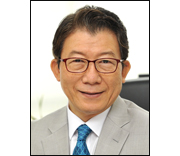-
[October 6, 2015 Korea times] Advocating capitalism
- Date : 2016.03.10
- Views : 363
Advocating capitalism
 |
By Jeffrey I. Kim
Iwant to deviate from my job as Ombudsman for this column and go back to my oldprofession as an economics professor to set some facts right about capitalismthat is increasingly beleaguered especially over the gap between the haves andhave-nots that has been deepening. This is an attempt to get back to basics andunderstand the ways of putting a human face on capitalism that works on marketprinciples.
In the aftermath of the global financial crisis and economic recessiontriggered by the collapse of Lehman Brothers in 2007, confidence in capitalismdropped. Critics argue that these events were the result of the failure ofcapitalism and seek a better economic system or ideology, such as so-called"warm capitalism." But it is unclear what this means.
I remember walking home from the library during my university years in Chicagoin the 1970s. It was winter and I was with a friend named Richard. He waswearing a beaver Russian Cossack hat without ear covers. I was wearing a furhat with ear covers. I asked my Minnesota-bred friend whether he was as cold asI was, and he said, "It is cool alright. But St. Paul used to be muchcolder than this."
"Hot and cold," it depends on where we come from, what we're used to.
The etymology of the word capital is the Latin "caput," which meant"head of livestock" in the 12th to 13th century. Capitalist refers tothe owner of the capital. The concept of free markets was created by AdamSmith, the father of modern economics and who coined the term "invisiblehand." He believed that when an individual pursues his self-interest, heindirectly promotes the good of society. If a selfish consumer tries to buygoods at a lower price and a selfish seller tries to sell those goods at ahigher price, they will reach a price they will both be optimally satisfiedwith.
After Adam Smith, many capitalist countries adopted the free market system.Later on, classical economists who focused on the supply side, used free-marketcapitalism as opposed to planned-economy communism.
After the 1929-1933 Great Depression, free-market capitalism was in crisis.John M. Keynes (1883-1946) bitterly criticized free-market economists andadvocated state intervention to stimulate the economy. His policy prescriptionwas adopted by numerous capitalist governments during the 1950s-60s.
However, Friedrich Hayek, Milton Friedman and other free-market economists wereconcerned that Keynesian economics favoring state intervention was becomingpredominant. They organized the Mont Pelerin Society (MPS) in 1947. They hadadmired Adam Smith for his theories about the "invisible hand" andfree markets. Even free-market economists admit that state intervention isneeded in the areas of pollution, national defense, education, health, and soforth.
The aim of the society was to facilitate the exchange of ideas among membersand study the virtues and defects of market-oriented economic systems. Itsleadership changed from Friedrich Hayek to Milton Friedman (1912-2006), andthen to Gary Becker (1930-2014). They were all professors at the University ofChicago and all won the Nobel Prize in economics. The free market system ensuresthe efficient allocation of resources, and private ownership provides theincentive to work harder. Therefore, free-market capitalism will continue to bethe backbone for the welfare of mankind.
Towards the end of the 20th century, however, the situation was again reversed.With the Asian financial crisis in 1997 and global financial crisis in 2007,opponents of free capitalism proclaimed that capitalism had come to an end.However, Becker refuted their criticism and persistently argued that economiccrises stem from unwise policies at the country level and lack of policycoordination at the global level.
Right before his death in May 2014, Becker strongly advocated capitalism. Hesaid, "In spite of some flaws, capitalism is the only system yet devisedthat brings the hope of lifting the masses out of poverty and creating a robustmiddle class." He also said, "The new leaders of China have expresseddissatisfaction with the performance of public enterprises, and have called forgreater participation by private firms in many sectors, including financialmarkets."
Countries that want to keep their capitalism warm, be they socialist ordemocratic, should keep in mind the following: (1) The degree of warmth ofcapitalism varies according to culture, history and most importantly nationalincome; (2) A freer market system and private ownership should go hand-in-handto maintain sustained growth; (3) Wiser policies in the areas of tax, welfareand capital market opening should be adopted; (4) The global policycoordination system should be improved to prevent a global crisis.
JeffreyI. Kim is the foreign investment ombudsman, a presidentially appointedtroubleshooter for investors and entrepreneurs from overseas. He earned hisPh.D. in economics at the University of Chicago and taught at the University ofColorado, Boulder, and Sungkyunwan University.
Link : http://www.koreatimes.co.kr/www/news/nation/2015/10/197_188022.html










